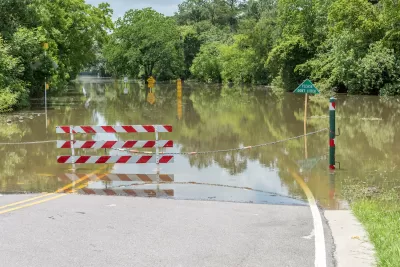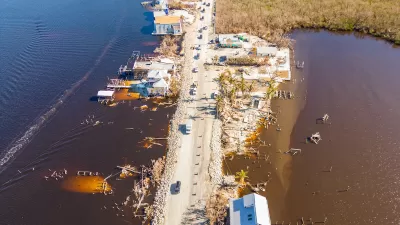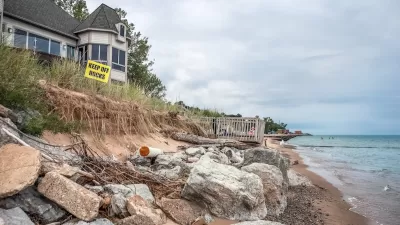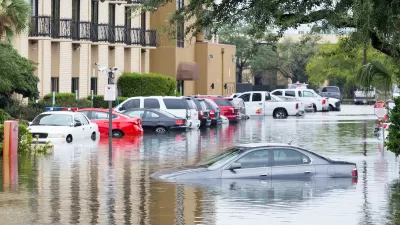As more Americans are displaced by wildfires, flooding, erosion, and other climate risks, safer regions should prepare for a wave of migration.

Parts of the country that are protected from many of the worst climate disasters and extreme weather could see a major influx of population in the next few years, writes Abrahm Lustgarten in The Atlantic, citing an interview with Beth Gibbons of the American Society of Adaptation Professionals (ASAP).
Tens of millions of Americans may move in response to these changes, fleeing coasts and the countryside for larger cities and more temperate climates. In turn, the extent to which our planet’s crisis can present an economic opportunity, or even reimagining, will largely depend on where people wind up, and the ways in which they are welcomed or scorned.
Gibbons says states like Michigan, where towns have underutilized infrastructure and relatively cheap housing, should encourage Californians and others displaced by wildfire risk to move there. “The Great Lakes region should market itself as a climate refuge, she thinks, and then build an economy that makes use of its attributes: the value of its water, its land, its relative survivability.”
However, climate migration can also lead to gentrification and tensions between old and new residents; “not so far down the line, forced migration could instead yield fears of newcomers as economic burdens.”
FULL STORY: America’s Climate Boomtowns Are Waiting

Planetizen Federal Action Tracker
A weekly monitor of how Trump’s orders and actions are impacting planners and planning in America.

Maui's Vacation Rental Debate Turns Ugly
Verbal attacks, misinformation campaigns and fistfights plague a high-stakes debate to convert thousands of vacation rentals into long-term housing.

San Francisco Suspends Traffic Calming Amidst Record Deaths
Citing “a challenging fiscal landscape,” the city will cease the program on the heels of 42 traffic deaths, including 24 pedestrians.

Amtrak Rolls Out New Orleans to Alabama “Mardi Gras” Train
The new service will operate morning and evening departures between Mobile and New Orleans.

The Subversive Car-Free Guide to Trump's Great American Road Trip
Car-free ways to access Chicagoland’s best tourist attractions.

San Antonio and Austin are Fusing Into one Massive Megaregion
The region spanning the two central Texas cities is growing fast, posing challenges for local infrastructure and water supplies.
Urban Design for Planners 1: Software Tools
This six-course series explores essential urban design concepts using open source software and equips planners with the tools they need to participate fully in the urban design process.
Planning for Universal Design
Learn the tools for implementing Universal Design in planning regulations.
Heyer Gruel & Associates PA
JM Goldson LLC
Custer County Colorado
City of Camden Redevelopment Agency
City of Astoria
Transportation Research & Education Center (TREC) at Portland State University
Jefferson Parish Government
Camden Redevelopment Agency
City of Claremont





























